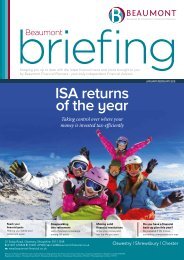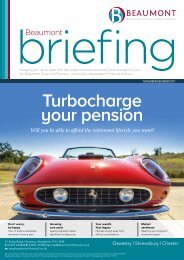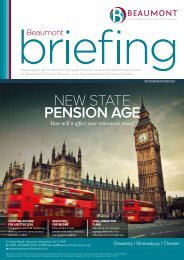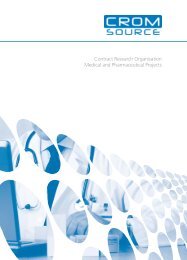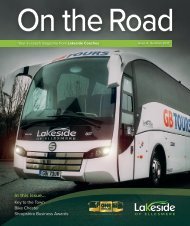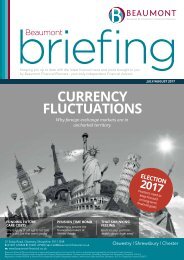sm74 (3)
You also want an ePaper? Increase the reach of your titles
YUMPU automatically turns print PDFs into web optimized ePapers that Google loves.
ESTATE PLANNING<br />
PASSING ON WEALTH WITHOUT<br />
FURTHER TAX CHARGES<br />
Over-55s risk falling prey to the inheritance ‘sibling tax trap’<br />
ON 6 APRIL 2017, A NEW ADDITIONAL MAIN RESIDENCE NIL-RATE BAND<br />
(RNRB) WAS INTRODUCED, WHICH ALLOWS FOR LESS INHERITANCE TAX<br />
TO BE PAID IN SITUATIONS WHEN A FAMILY HOME IS LEFT TO CHILDREN,<br />
GRANDCHILDREN OR CERTAIN OTHER ‘QUALIFYING BENEFICIARIES’ –<br />
INCLUDING STEPCHILDREN AND FOSTER CHILDREN.<br />
But<br />
[1]<br />
more than 1.7 million over-55s could<br />
miss out because they’ve assigned their<br />
sibling to inherit their family home and<br />
not a direct descendant.<br />
PASSING A FAMILY HOME TO<br />
SIBLINGS RATHER THAN TO<br />
CHILDREN OR OTHER DESCENDANTS<br />
Research from the LV= independent legal<br />
service shows that one in ten over-55s (10%)<br />
have written their Will to pass their family home<br />
to their siblings rather than to their children<br />
or other descendants, which would lead them<br />
to be ineligible to utilise the additional RNRB.<br />
Previously, if an estate of a married couple<br />
was left to any descendant, anything above<br />
the £650,000 combined threshold (£325,000<br />
allowance per individual) would have been<br />
taxed at 40% Inheritance Tax.<br />
INHERITANCE TAX–FREE ALLOWANCE<br />
FOR THE FAMILY HOME<br />
However, from 6 April 2017, the RNRB<br />
has been introduced with an RNRB of<br />
£100,000 per person, taking the total<br />
maximum individual personal allowance<br />
for Inheritance Tax from the current level<br />
of £325,000 to up to £425,000, or a total<br />
of up to £850,000 for married couples and<br />
registered civil partnerships.<br />
LEAVING THE FAMILY ESTATE WITH<br />
AN INHERITANCE TAX LIABILITY<br />
The allowance for the family home is set to<br />
increase by £25,000 per tax year, so by 6 April<br />
2020 onwards a couple with a family home may<br />
potentially be able to leave their children or<br />
other direct descendants a combined estate of<br />
up to £1 million without any Inheritance Tax to<br />
pay. However, if the same couple were to leave<br />
their family estate to a sibling, the Inheritance<br />
Tax of 40% would apply on the difference<br />
between £650,000 and £1 million, leaving an<br />
Inheritance Tax bill of up to £140,000.<br />
YOU MAY NEED<br />
TO AMEND YOUR WILL<br />
The majority of the people surveyed (72%)<br />
don’t know of or understand the changes that<br />
have come into force in this new tax year. If<br />
appropriate, you may need to amend your<br />
Will to ensure your estate can benefit from the<br />
increased allowance. Even among those who<br />
do know about the changes, half (53%) didn’t<br />
realise that the increased tax-free amount can<br />
apply to cash proceeds from the sale of the<br />
home if you downsize or have to go into care.<br />
WELL-THOUGHT-OUT ESTATE PLAN<br />
Worse still, many people living ‘as married’ with<br />
partners – who would want their wealth passed<br />
to each other – don’t have Wills (44%). Therefore,<br />
unless assets are jointly owned as ‘joint tenants’,<br />
their estate will pass to their children who would<br />
have no obligation to provide anything to their<br />
father or mother’s partner. It has never been more<br />
important to have a well-thought-out estate plan,<br />
complete with an appropriate Will and supporting<br />
documentation, to ensure your assets can pass to<br />
your loved ones in a tax-efficient manner. t<br />
COULD YOU FALL PREY<br />
TO THE SIBLING TRAP?<br />
This increased Inheritance Tax allowance is a<br />
boost to those who’ve seen their homes rise<br />
in value and want to be able to pass on this<br />
wealth without further tax charges, but it’s crucial<br />
that they don’t fall prey to the sibling trap. The<br />
RNRB rules can be complex. Getting the right<br />
professional advice and amending your Will<br />
could take a few hours, but with potential to save<br />
a lot of money it’s time well spent.<br />
LEVELS, BASES OF AND RELIEFS FROM<br />
TAXATION MAY BE SUBJECT TO CHANGE, AND<br />
THEIR VALUE DEPENDS ON THE INDIVIDUAL<br />
CIRCUMSTANCES OF THE INVESTOR.<br />
Source data:<br />
[1] There are 17.6 million over-55s in the UK (ONS<br />
population maps). Of the over-55s surveyed, 10%<br />
said they’d left their home to siblings rather than<br />
their children or grandchildren – equivalent to<br />
1.7 million over-55s.<br />
LV= commissioned Opinium Research to conduct<br />
bespoke research among a sample of 1,000 UK<br />
residents who are over 55 years of age. Surveys<br />
were conducted online between 8 and 14 December<br />
2016 and are nationally representative.<br />
11










